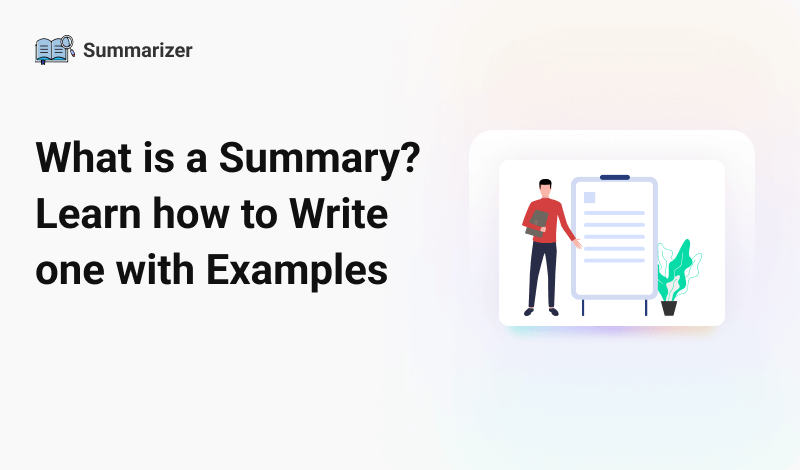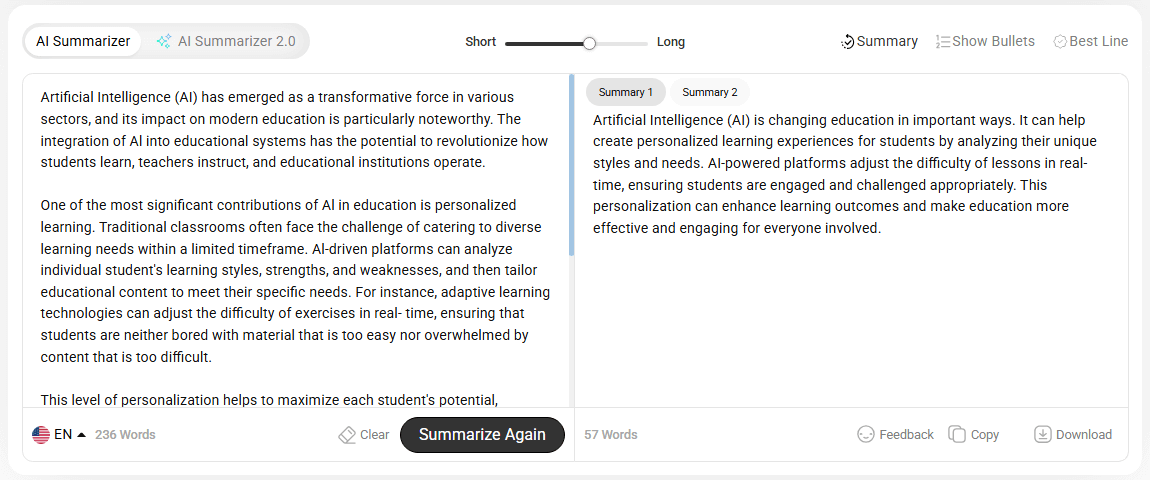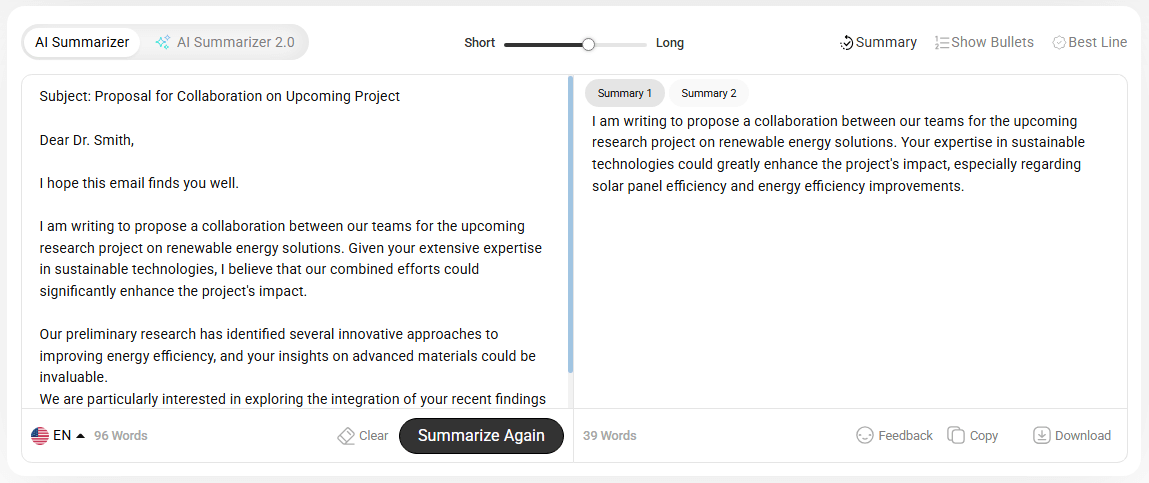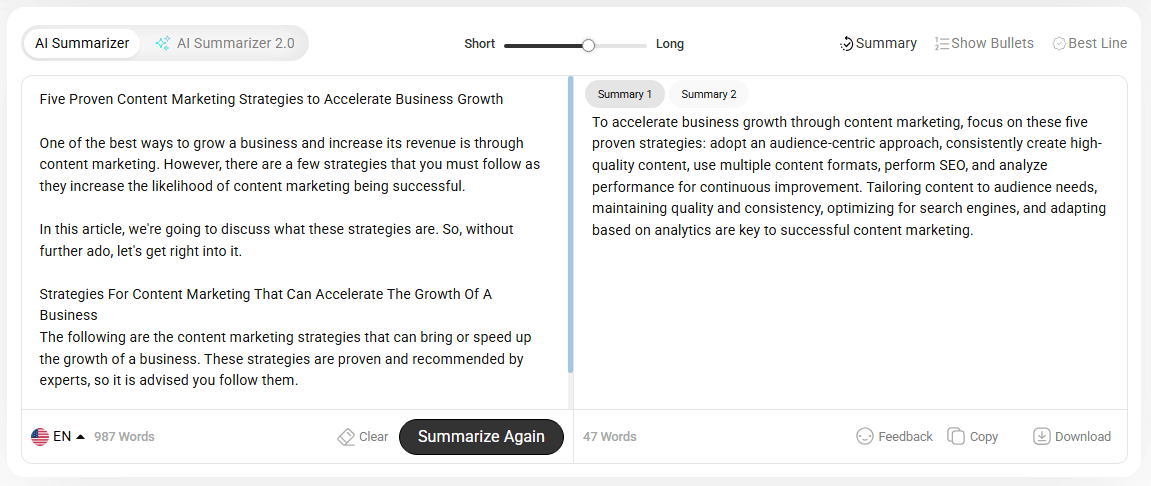
A summary is a condensed version of a long piece of text. It helps the readers quickly grasp the main points and the content's core message. There are multiple types of summaries that are abstractive summary, informative summary, executive summary, descriptive summary, and so on.
Sudents, professionals, and others may often need to craft a summary so they can enhance comprehension and retention of material. They might also need to do it to quickly provide the key points of a document and aid in studying or decision-making processes.
That said, creating a good summary demands time and focus. Even then, there are chances of errors. This is why, in this article, we’ll teach you how to write an effective and accurate summary with examples. So, without wasting any time, let’s get into it.
Following are the steps to write an effective summary for any text on hand. We’ll discuss each one in as much detail as possible so they are easy for you to follow.
The first thing you should do is read the text that you want to summarize carefully. Try to understand what exactly it means, what’s its context, and what is the core message it’s trying to convey.
While you’re at it, take a look at its supporting details as well. Doing these things will help in creating an accurate summary that effectively captures everything in the text.
If you can’t seem to understand the whole text in one reading, give it another go. Additionally, to make things easier for yourself, you can divide the text into sections and read them one by one for better understanding.
Once you’ve read and understood the text extensively, it is time to highlight the main points from it. All the important information, arguments, and examples must be highlighted while ignoring the unnecessary ones. For this, consider the things that have contributed the most in conveying the main idea.
To exemplify this, we’re attaching an image below that shows us highlighting the main points from a text.

To take this a step further, you can note the important bits down as well. This will enable you to put together a good summary without having to open the document or original text and go through it to find the highlighted bits.
As we’ve mentioned, a summary is made by combining the main points in a way that makes sense. This step focuses on doing so. Try to write the points chronologically, in a way that every bit of important information is conveyed.
While combining the points, it is important to paraphrase them for improved clarity as well. Write them in your own words and avoid copying sentences as they are.
Additionally, you can add transition words and phrases where needed so the flow can be improved. This way, you’ll have an engaging and well-made summary on your hands.
You must think now that you have a summary on hand, the process is over. Well, it’s not because proofreading has to be done.
Thoroughly check your summary to see if any point or important information is missing. Ensure that your summary accurately reflects the original text and that the intended meaning is the same. Besides this, it is recommended that you check for errors as well. Some of the common errors that are worth looking out for are as follows.
If any mistakes surface in your summary while proofreading, you should fix them. Don’t hesitate to edit. Add any missing information, or punctuation, and remove anything that has to be removed.
The steps that we’ve mentioned above are a bit time-consuming and require much of your focus. Fortunately, there’s a better way available for creating summaries. One that takes much less time and effort.
It is to use an automated tool for summary creation. One such Website that can be used for this purpose is AI Summarizer. It can generate any type of summary for any given text in an instant.
All that you have to do to get results from it is provide it with the text, adjust the length you want the summary to be, and hit “Summarize”.
That said, we’re attaching a screenshot of the said tool below that shows it summarizing our provided text.
As can be seen, the generated summary is quite good and can be used without hesitation.
To exemplify, we’ll create a summary of three different text pieces below by using the said tool and starting with an essay.
We’ll summarize the essay “The Role of Artificial Intelligence in Modern Education.”

The textual output that the tool provided us can be seen below.
Artificial Intelligence (AI) is transforming the education sector by enabling personalized learning. AI-driven platforms analyze students' learning styles and adapt educational content to meet their specific needs. It also streamlines administrative tasks, automating grading systems and providing insights into student performance. AI enhances accessibility by providing tools for students with disabilities, such as speech-to-text and text-to-speech applications. These advancements create an inclusive learning environment where all students can thrive. |
The second example will show us summarizing a professional email whose subject is going to be “Proposal for Collaboration on Upcoming Project.”

The textual output that Sumamrizer.org provided us is as follows.
I am writing to propose a collaboration between our teams for the upcoming research project on renewable energy solutions. Your expertise in sustainable technologies could greatly enhance the project's impact, especially regarding solar panel efficiency and energy efficiency improvements.
|
For the last example, we’ll be summarizing a aricle titled “Five Proven Content Marketing Strategies to Accelerate Business Growth.”

You can see the textual output of the tool below.
To accelerate business growth through content marketing, focus on these five proven strategies: adopt an audience-centric approach, consistently create high-quality content, use multiple content formats, perform SEO, and analyze performance for continuous improvement. Tailoring content to audience needs, maintaining quality and consistency, optimizing for search engines, and adapting based on analytics are key to successful content marketing. |
These are the examples of a good summary. They effectively encapsulate the main ideas from the original text and put them forward in a compelling manner.
Creating a summary isn’t that hard. In this post, we have explored everything you need to know about it and have provided steps on how you can make an effective summary of any text. We’ve also provided examples and discussed a better way for those who are looking to save some time and effort.